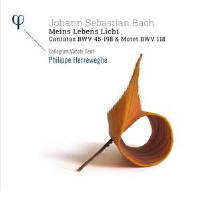Texte paru dans: / Appeared in: |
|
|
Outil de traduction (Très approximatif) |
|
|
Reviewer:
Jonathan
Freeman-Attwood Philippe Herreweghe’s corpus of cantatas from Virgin, Harmonia Mundi and now PHI constitutes one of the most elegant and satisfying of Bachian recorded drip-feeds over the past 30 years. The main work is the Trauer Ode, which Collegium Vocale recorded back in 1987, yet it still remains mystifyingly elusive in the canon given its credentials: an impeccably crafted score, evidence of a close collaboration with the eminent Enlightenment poet Gottsched, and its exquisite repository of bittersweet conceits on the death of a celebrated Saxon Protestant Queen in 1727, redolent of the St Matthew Passion in full flow. It’s no surprise Bach reused much of it for his now lost St Mark Passion. It also offers a rare biographical insight of Bach elbowing aside the prerogative of the University Kapellmeister to compose ‘on his own patch’ when Bach clocked that he had a chance to write and perform for ‘royal personages, high ministers, cavaliers and other such visitors’. The difference between Herreweghe’s earlier recording and this reading is all about atmosphere. The work’s delicate imagery is now affectionately exhibited with an open grief and an ‘in memoriam’ gratitude generously embedded, rather than the studied restraint of the older version. The singers and instruments circumnavigate the music with collective fluency, from the pungent textures of the opening to the fluttering sounds of funeral bells caught in the wind (in the fourth stanza) and a dancing fugue depicting the queen’s life as an example for great women. The instrumentation is one of the work’s glories with its soft palette of flutes, recorders, gambas, lutes and strings. Herreweghe relishes its seemingly endless coloration and how the Ode at the same time both eschews and adopts galant sensibilities – but entirely on Bach’s terms. This is where previous readings stand or fall. Only in the last movement do Collegium Vocale rest too much on decorum ahead of poignancy. Elsewhere, the sinews of the Ode are explored with all the success of Jürgen Jürgens’s deeply moving account (Teldec, 11/67 – nla) and, more recently, Pierre Pierlot and the Ricercar Consort. The solo singing is universally excellent and well suited to the soft-grained declamation of Gottsched’s reforming language. If this isn’t enough, the performance of Cantata No 45 is as uplifting as exists on record (Richter and Gardiner both have something special to say here) and the exquisite short funeral motet, O Jesu Christ, meins Lebens Licht, is tailor-made for Herreweghe. No one else peels back those tactile homogeneous phrases with quite such luminosity and deep-seated finesse as Collegium Vocale. |
|




